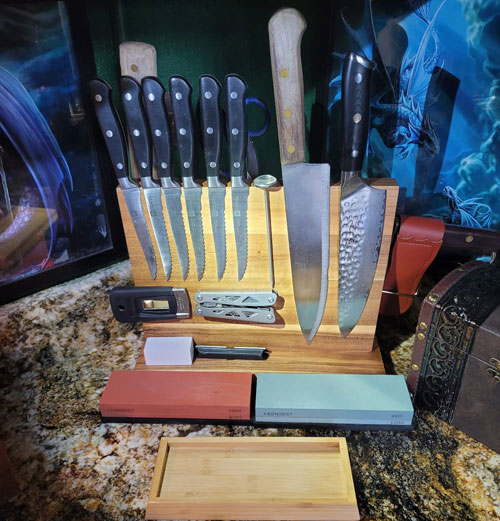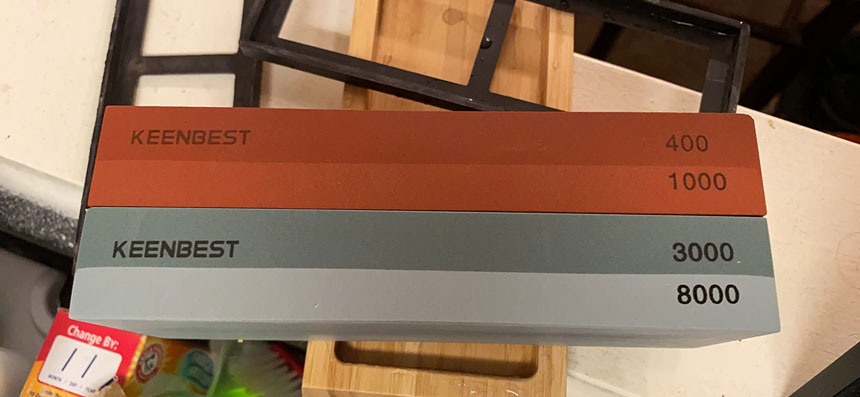Choosing the best sharpening stones for woodworking can be intimidating as there are a variety of chisels and planes with different sharpening needs. Thus, it can be challenging to determine which kind of sharpening stone is good for your woodworking tools. However, identifying the kind of chisel you’re using can greatly help you choose the type of sharpening stone that is most suitable for your tools.
Want to buy the best sharpening stone for kitchen knives?
Although some chisels can be sharpened with any kind of sharpening stone, some have specific needs and can be sharpened with only a particular sharpening stone. In this article, we have covered the various types of sharpening stones alongside what kinds of chisels you can sharpen with them.
3 Types of Stones
Water Stones
Water stones are the sharpest stones and come with a wide range of grits. These stones are typically made of aluminum oxide abrasives that make them more convenient and easier to use. Although oil stones are also made of this material, water stones are more reliable and sharper in nature. Firstly, they require water for clean up in spite of oil which makes it inexpensive. Secondly, the binding material that holds the stone together is softer in nature which helps to sharpen the tools faster than oil stones making it the best choice for woodworking tools. [1]
Since water stones come in a wide variety of grits, specifically coarse grits, you can sharpen almost all kinds of chisels and planes with this stone. However, it would be best to avoid the sharpening of heavy-duty chisels on water stones due to their softness.
Prominent Pros
- Fast sharpening
- Inexpensive
- Offer a wide range of grits
Notable Cons
- Require flattening for heavier chisels
Oil Stones
Oil stones are another excellent option to sharpen heavy-duty chisels. They are both man-made and natural. Man-made oil stones are generally made of silicon carbide or aluminum oxide abrasive and are available in fine, coarse, and medium grits.
On the other hand, natural stones are made of novaculite and tend to be harder than water stones. This means you would not have to flatten the oil stones as often as the water stones. So if you have heavy-duty oil stones are the ideal choice for you.
Are diamond stones better than whetstones?
Prominent Pros
- Available in medium, coarse, and fine grits
- Harder than water stones
- Require less flattening
- Inexpensive
Notable Cons
- Limited grit range

Diamond Stones
Diamond stones are the most popular sharpening stones among woodworkers due to their durability and convenience. Unlike water stones and oil stones, Diamond stones don’t need flattening. You also don’t need to soak the stone in water or oil before sharpening. So, if you’re looking for a stone that doesn’t require any maintenance then this is the ideal stone for you.
Looking for a professional knife sharpening stone kit? You should check our guide for this.
Moreover, diamond stones are highly versatile and you can sharpen a wide variety of chisels and iron planes on them such as carbide-tipped router bits. However, diamond stones have a limited range of grits that’s why they are mostly used to flatten the chisels. [2]
Prominent Pros
- Versatile and highly durable
- Don’t require maintenance
- Don’t require flattening
- Fastest cutting
Notable Cons
- Limited grit range
- Expensive
Final Verdict
Choosing a sharpening stone for woodworking is an important task and it would be best if you choose the sharpening stone based on the type of chisels and iron planes you have. Above we have provided a complete detail of the three most important types of stones that are considered to be ideal for woodworking tools.
So, carefully read the above article and choose the ideal sharpening stone for your chisels and iron planes.
References



